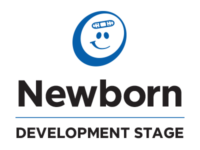Downloadable Files
- Development Stage Newborn, Well Child Visit
- Newborn Screening - SWYC
- Under 5 Screening - CCSN
- Vaccinations
DEVELOPMENT
Daily Activities
- Your baby is learning to use his/her eyes and ears
- Smiling faces and gentle, pleasant voices are interesting
- Many mothers find the new baby brings a lot of new work. Help from fathers, family and friends is very important during this time
- It is common for your baby to sleep 16 or more hours per day
- Healthy babies should be placed on their backs to reduce the risk of SIDS
Motor Skills
- Movements may appear jerky, this is normal
- Your baby is not expected to support its head yet
- The grasp may be present at birth
Vision
- May follow moving objects with eyes
- Explores surroundings with eyes
Hearing
- Turns in direction of some sounds
FEEDING
Your baby needs only breast milk or infant formula for healthy growth. We recommend feeding your baby every two to three hours. By feeding frequently we hope to help your baby sleep longer stretches very soon. Now is not the time for cereal or juices. We’ll cover solids in detail at the four month visit.
Always hold your baby during feeding time. It is a great way to show love for your baby. Never prop the bottle.
SAFETY TIPS
- Never leave your child alone, except in a crib.
- Use a crib with slats not more the 2 3/8” apart
- Place your baby in the bed on his/her back ONLY.
- Keep pillows, animals and extra blankets out of the crib. Keep the crib sides up.
- Never eat, drink, or carry anything hot while you are holding the baby
- Set water heater temperature to 120F (50C).
- Never allow smoke near your baby.
- Use an approved infant car safety seat. Follow instructions for proper installation. Parents should wear seat belts to set good example.
NO WORRIES
Each child is unique. It is therefore difficult to describe exactly what should be expected at each stage of a child’s development. While certain behaviors and physical milestones tend to occur at certain ages, a wide spectrum of growth and behavior for each age is normal. These guidelines are offered as a way of showing a general progression through the developmental stages rather than as fixed requirements for normal development at specific ages. It is perfectly natural for a child to attain some milestones earlier and others later as they continue to grow and learn.
CALL US IMMEDIATELY IF:
- Your baby develops a fever over 100.5 axillary (rectal)
- Your baby is irritable and you cannot calm him/her
A LITTLE NOTE:
Almost all babies develop nasal congestion during the third or fourth week. This is usually normal and does not mean your child is ill. We recommend saline irrigation and a bulb syringe as the best treatment. Saline solution can be made at home by combining eight ounces of water with 1/4 tsp. table salt and a pinch of baking soda. This may be kept in the refrigerator for several days.
CONSTIPATION: WHAT IS IT?
Although we hope our children will pass one to two bowel movements every day, we do not become concerned unless your child has not passed any bowel movement for four days. Frequently only patience is required. Call us if you need further help.






